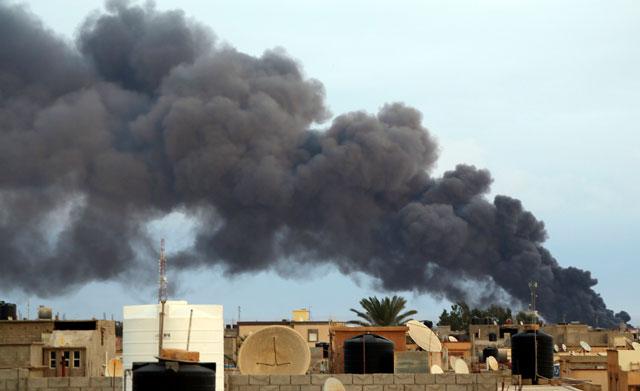You are here
Three years after Libya revolt, ‘Dubai dream’ still far off
By AFP - Oct 23,2014 - Last updated at Oct 23,2014

BENGHAZI, Libya — When longtime dictator Muamamr Qadhafi's regime collapsed in a 2011 revolution, many Libyans looked to affluent and booming Dubai as an example of what the future could hold.
Three years on, they fear a Somalia-like "failed state" status, with the North African nation awash with weapons, lawless, at the mercy of militias and in political chaos.
On October 23, 2011, three days after Qadhafi was captured and killed, transitional authorities announced the "total liberation" of Libya, in a joyous declaration from the eastern city of Benghazi, birthplace of the eight-month conflict.
This year, there is no official programme for Thursday to celebrate what has become a national holiday.
In a country with two governments — one internationally recognised and the other self-declared — the anniversary comes at a time of deadly clashes between pro- and anti-government militias in Benghazi and west Libya.
"When the country's 'liberation' was announced, our ambition was to become a new Dubai thanks to oil revenues," said Mohamed Al Karghali, a 39-year-old teacher who fought in the revolt.
"Today, we fear becoming another Somalia or Iraq," he said.
Many Libyans even yearn for the stability of the Qadhafi days.
"The rampant regional, ideological and tribal conflicts are worse than the rule of the dictator," said Salah Mahmud Al Akuri, a doctor in Benghazi.
"Some Libyans are looking back to the old regime despite their hatred of Qadhafi."
Military expert and ex-army officer Suleiman Al Barassi said the bloodshed of the past three years has been as deadly as the revolution which cost thousands of lives.
He pins the blame on the impunity with which militias operate.
The authorities have failed to establish a new regular army or professional police force, opting to rely on militias whose interests ultimately take priority over long-term loyalty.
The militias, made up of former rebel fighters, were set up on the basis of ideological, tribal, regional or even criminal ties.
Libya 'abandoned'
Benghazi has become a bastion of radical Islamists and a hub for attacks on security forces, journalists, political activists and Western interests.
Deserted by diplomatic missions, the Mediterranean city fell to Islamist militias in July when they drove out pro-government forces.
Almost 100 people were killed last week in a new offensive launched by forces loyal to a former general, Khalifa Haftar, a Qadhafi-era officer turned rebel, to retake the city.
Authorities had accused the controversial figure of trying to mount a coup when he embarked on a first anti-Islamist campaign in Benghazi that was unsuccessful back in May.
But with their control over Libyan territory shrinking, the government and its armed forces this time had little option but to side with Haftar.
As for Tripoli, the capital fell to a militia coalition, Fajr Libya, at the end of August after several weeks of fighting with pro-government militias from Zintan, to the west.
Fajr Libya, made up of militiamen from Misrata to the east and Islamists, seized Tripoli shortly before a newly elected parliament, dominated by anti-Islamists, took office.
Insecurity in the capital has led to most Western countries evacuating their nationals, closing embassies and pulling out foreign companies, further isolating the country.
Even the government and parliament have sought refuge in Tobruk, in the far east of Libya, while their Islamist-backed rivals have set up a parallel administration in Tripoli.
The south of the country has not been spared the mayhem, as tribes battle for control of a lucrative smuggling trade.
Hopes of an economic boom in the oil-producing state whose infrastructure is being battered each day and of a peaceful transition to democracy have all but vanished in Libya's desert sands.
University scholar Mohamed Al Kawash accused NATO countries — who waged an air campaign to help oust Qadhafi — of having "abandoned" Libya and failing to contribute to post-war reconstruction.
On a surprise visit to Tripoli earlier this month, UN chief Ban Ki-moon appealed to Libya's warring factions to end the turmoil.
"Let me be clear: if violent confrontations do not cease immediately, if sustainable peace is not restored, prosperity and a better life will be a distant dream," Ban warned.
Related Articles
Libya's internationally recognised prime minister said Saturday that military forces in the strife-torn country had united to try to recapture Tripoli and the second city Benghazi from Islamist militias.
As fears grow that Daesh is building a new stronghold in violence-wracked Libya, analysts warn that international military intervention would risk plunging the country deeper into turmoil.
BENGHAZI — A warplane operated by forces loyal to Libya's recognised government crashed Monday near the eastern city of Derna after attackin
















